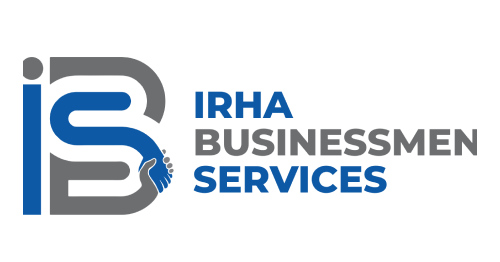VAT Services
Home/ VAT Services

Expert Guidance Through
The Complexities of VAT
Don't let VAT be a headache! IRHA Businessman Services offers expert guidance to simplify VAT for your business. We'll navigate the complexities, ensuring compliance and maximizing your refunds. Get a free consultation and breathe easy!
Why Choose
IRHA Businessmen Services?
- Expertise: Our team consists of experienced VAT professionals with in-depth knowledge of local and international VAT regulations.
- Tailored Solutions: We understand that each business is unique. Our solutions are customized to address your specific challenges and goals.
- Commitment to Excellence: We are committed to delivering high-quality services that prioritize accuracy, compliance, and financial optimization.
Transform your VAT challenges into opportunities for growth and efficiency with IRHA Businessmen Services. Contact us today to learn more about how we can support your VAT needs.

Our Services Include
VAT Registration and Compliance
We handle all aspects of VAT registration and ensure ongoing compliance with local regulations, minimizing the risk of penalties and fines.
VAT Advisory Services
Our expert advisors provide strategic insights tailored to your business, helping you navigate complex VAT issues and optimize tax efficiency.
VAT Planning and Structuring
We develop customized VAT strategies to align with your business goals, maximizing savings and operational efficiency.
VAT Return Preparation and Filing
: Trust our meticulous approach to prepare and file accurate VAT returns on time, easing your administrative burden.
VAT Audit Support
In the event of a VAT audit, we provide comprehensive support and representation to ensure a smooth process and favorable outcome.
Drive Success:Custom VAT Solutions for Compliance and Financial Optimization
VAT Registration
Eligibility Assessment
Determining if your business meets the criteria for mandatory or voluntary VAT registration.
Documentation Preparation
Assisting in gathering and preparing the necessary documents for VAT registration.
Submission and Follow-Up Submitting the registration application to the Federal Tax Authority (FTA) and following up until the registration certificate is issued.
VAT Deregistration
Eligibility Check
Ensuring that your business meets the criteria for VAT deregistration.
Application Process
Preparing and submitting the deregistration application and managing any follow-up requirements.
VAT Return Filing
Preparation and Filing
Data Collection
Gathering relevant financial data and transaction details for the tax period.
Return Preparation
Preparing accurate VAT returns, including sales, purchases, input and output VAT calculations.
Submission Filing the VAT return through the FTA portal within the specified deadline.
Payment Assistance
Assisting with the calculation and payment of any VAT due.
VAT Advisory Services
Compliance Advisory
Regulatory Updates
Keeping businesses informed about changes in VAT laws and regulations.
Impact Analysis
Assessing the impact of VAT on your business operations and financials.
Strategic Planning Providing advice on VAT-efficient business strategies and structuring.
Transaction Advisory
Review of Contracts
Reviewing contracts and agreements to ensure VAT compliance.
Transaction Structuring
Advising on the structuring of transactions to optimize VAT efficiency.
VAT Audit and Assurance
Internal VAT Audits
Compliance Checks
Conducting periodic internal audits to ensure VAT compliance.
Risk Assessment
Identifying potential areas of non-compliance and associated risks.
Recommendations Providing actionable recommendations to address compliance issues.
FTA Audits
Audit Preparation
Assisting businesses in preparing for FTA audits.
Support During Audit
Providing support and representation during FTA audits.
Post-Audit Assistance
Helping businesses address any issues or queries raised by the FTA.
VAT Refunds
Eligibility Assessment
Reviewing Transactions
Assessing transactions to determine eligibility for VAT refunds.
Documentation Preparation
Gathering and preparing necessary documents for refund applications.
Refund Application
Submission
Submitting VAT refund applications to the FTA.
Follow-Up
Managing follow-up communications with the FTA to ensure timely processing of refunds.
VAT Training and Workshops
Staff Training
Customized Training Programs
Developing training programs tailored to your business needs.
Workshops and Seminars
Conducting workshops and seminars to educate employees on VAT regulations and compliance.
Continuous Learning
Updates and Refreshers
Providing regular updates and refresher courses on VAT compliance and best practices.
The introduction of Value Added Tax (VAT) in the UAE was driven by several strategic and economic reasons. Here are the key motivations behind implementing VAT in the UAE:
Diversification of Revenue Sources
Reducing Dependency on Oil Revenues
Economic Sustainability
The UAE's economy has historically relied heavily on oil revenues. With fluctuating oil prices and a global shift towards renewable energy, there is a need to diversify revenue sources to ensure long-term economic stability.
Non-Oil Economy
By introducing VAT, the UAE aims to create a more balanced and sustainable economy that is less dependent on oil.
Strengthening Fiscal Stability
Increasing Government Revenues
Public Services
VAT provides a steady source of income for the government, which can be used to fund public services such as healthcare, education, and infrastructure.
Fiscal Health
A broader tax base contributes to the overall fiscal health of the country, allowing for more robust financial planning and management.
Aligning with International Standards
Economic Integration
GCC VAT Framework
The UAE, as part of the Gulf Cooperation Council (GCC), agreed to implement VAT as part of a unified tax framework among GCC countries. This helps harmonize economic policies and fosters closer economic integration within the region.
Global Practices
Many developed and developing countries use VAT as a major source of revenue. Implementing VAT aligns the UAE with international tax practices and standards.
Encouraging Responsible Spending and Saving
Consumer Behavior
Consumption Tax
VAT is a consumption tax, meaning it is paid by consumers when they purchase goods and services. This encourages consumers to be more mindful of their spending, promoting responsible consumption.
Saving Incentives
With VAT in place, there is an indirect incentive for individuals to save more, as savings are not subject to VAT.
Enhancing Transparency and Compliance
Business Practices
Formal Economy
VAT implementation encourages businesses to maintain proper records and adhere to regulatory requirements. This reduces the size of the informal economy and increases transparency in business transactions.
Compliance
Regular filing of VAT returns and maintaining accurate records helps improve overall business compliance with tax regulations.
Conclusion
The introduction of VAT in the UAE is a strategic move aimed at ensuring economic sustainability, fiscal stability, and alignment with international standards. By diversifying revenue sources, enhancing transparency, and promoting responsible consumption, VAT helps create a more robust and resilient economy, better equipped to face future challenges and support long-term development goals.
Frequently Asked Questions (FAQ) About VAT
VAT (Value Added Tax) is a consumption tax levied on the value added to goods and services at each stage of their production or distribution. It is typically a percentage of the sale price, which businesses collect on behalf of the government.
VAT was introduced to diversify the UAE’s revenue sources, reduce reliance on oil revenues, strengthen fiscal stability, align with international standards, and support the country’s long-term economic and social development.
Yes, tourists can reclaim VAT on purchases made in the UAE through designated refund offices at exit points such as airports and seaports.
Businesses can register for VAT through the Federal Tax Authority (FTA) e-Services portal by creating an account, completing the registration form, and submitting required documents such as the trade license and passport copies of the business owners.
VAT returns are usually filed quarterly. However, businesses with higher turnovers may be required to file monthly.
A tax invoice must include the supplier’s name, address, TRN, the date of the invoice, a description of the goods or services, the total amount payable including VAT, and the VAT amount.

